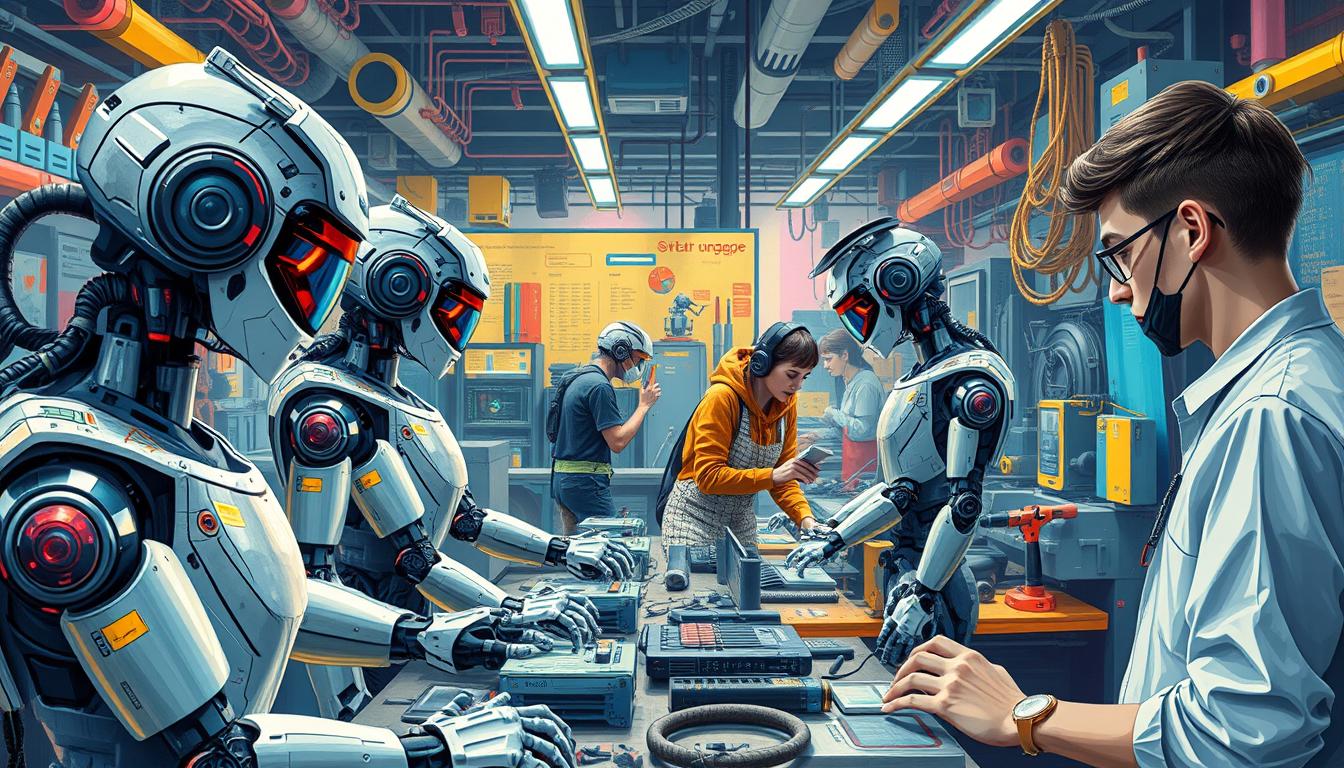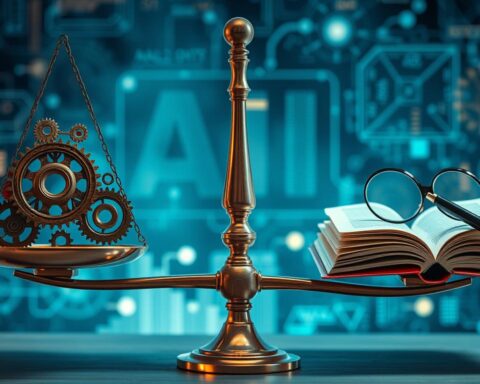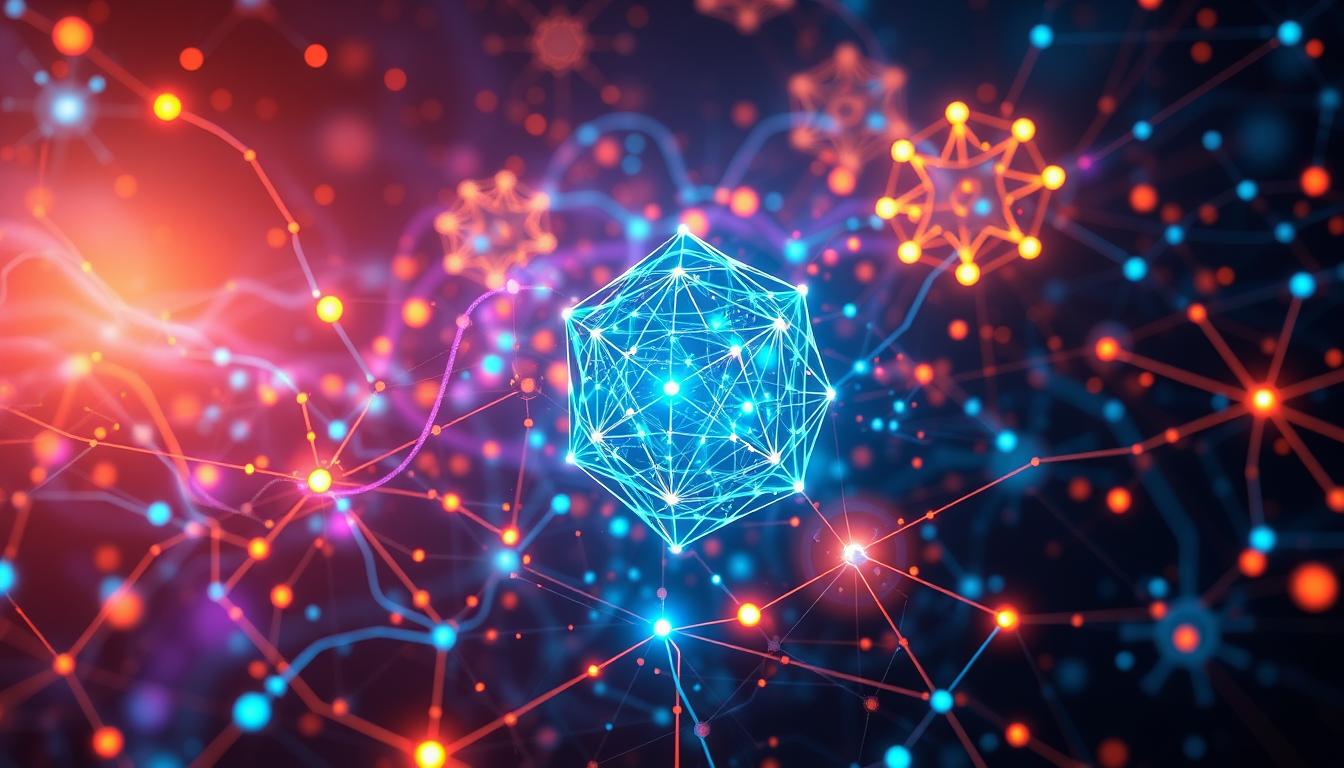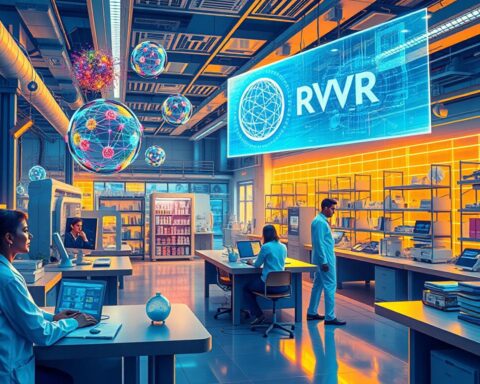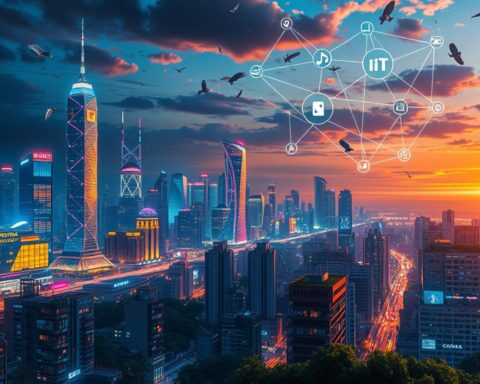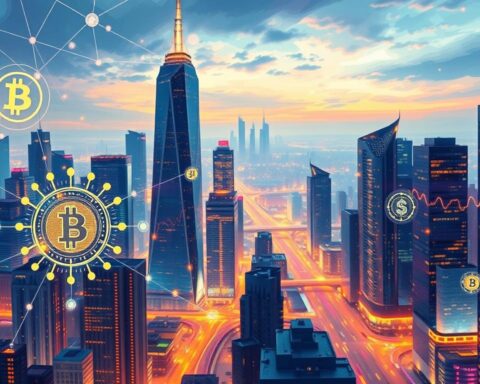The Covid-19 pandemic forced nearly all workplaces to go online quickly, showing the need for flexibility in work1. As artificial intelligence grows, it’s key to grasp its job market effects. Hybrid work mixes online and in-person teamwork, reshaping our work habits1. Many adults now lack skills for new jobs in a fast-changing job market1.
Understanding artificial intelligence’s workforce impact is critical for the future. The need for skilled workers in ai fields has grown, thanks to increased demand for ground truth data in the automotive industry2. With ai’s rise, new job chances appear. It’s important to learn the skills needed to succeed in an ai-based economy.
Key Takeaways
- AI is changing the job market, and it’s vital to understand its job and skill impact.
- The rise of hybrid work has changed how we work, and being adaptable is key to success.
- Many adults lack essential skills for new jobs in a fast-changing job market1.
- The demand for ground truth data in the automotive industry has significantly increased2.
- Learning skills in ai-related fields is essential to thrive in an ai-driven economy.
- Artificial intelligence is making some jobs more efficient and productive by augmenting human abilities.
Understanding AI’s Impact on Jobs and Skills in Today’s Workforce
AI is changing the job market, leading to a big workforce transformation. As AI gets better, it’s being used in many fields. This means many tasks are now automated, letting people focus on creative and innovative work3.
This change is because of AI’s automation effects. AI can do repetitive tasks, freeing up people for more complex and valuable work3.
A study by the University of Oxford says nearly 47% of US jobs could be automated by AI in the next 20 years4. Goldman Sachs found that generative AI tools could affect around 300 million full-time jobs worldwide4. The finance and banking sector is at high risk because AI can do data analysis, fraud detection, and customer service better4.
The sectors most affected by AI include manufacturing, transportation, and customer service. For example, in manufacturing, AI can automate tasks like assembly and inspection, making things more efficient and cheaper. In transportation, AI can improve routes and schedules, saving fuel and reducing emissions. It’s important to look at both the risks and benefits of AI in the workforce. For more info, visit this link.
Current State of AI Integration in Various Industries
- Manufacturing: AI can be used to automate tasks such as assembly and inspection, increasing efficiency and reducing costs.
- Transportation: AI can be used to optimize routes and schedules, reducing fuel consumption and lowering emissions.
- Customer Service: AI can be used to automate customer inquiries and complaints, improving response times and customer satisfaction.
Key Statistics on Job Market Transformation
A report says AI is making tasks repetitive, focusing on human strengths like creativity and critical thinking3. It’s key for workers to keep learning as AI changes job roles3. Workers with lower skills are more likely to lose their jobs because of AI3.
| Industry | AI Adoption | Job Displacement |
|---|---|---|
| Manufacturing | High | Medium |
| Transportation | Medium | Low |
| Customer Service | High | High |
Jobs Most Vulnerable to AI Automation
AI technology is getting better, making some jobs at risk of being automated. A Goldman Sachs report from 2023 says about 300 million jobs in the U.S. and Europe might be lost or changed because of AI5. This shows we need to learn new skills to keep up with these changes.
Jobs at risk include those with lots of repetition, like data entry, and roles in customer service. Companies are hiring slower because of AI, as Alphabet’s CFO Ruth Porat pointed out5. Also, jobs that face more AI are growing faster in productivity than others6.
To keep up with the job market, we must learn new skills. These include making complex business decisions and understanding AI. PwC says skills for jobs with more AI are changing faster than for others6. Knowing which jobs are at risk and what skills are needed helps us prepare for the future.
Also, 69% of global CEOs think AI will make most jobs need new skills6. This shows how important it is to keep learning and updating our skills. By understanding the risks and taking steps to improve, we can make the job market better and open up new chances for everyone.
Learn more about AI’s effect on jobs in recent studies. They say workers need skills like creativity and emotional intelligence to work well with AI. This way, we can make sure AI benefits everyone and helps our workforce grow.
Emerging Opportunities in the AI-Driven Economy
The job market will see big changes with AI. By 2025, 85 million jobs might be lost to automation7. But, 97 million new jobs could be created, making a net gain in employment7. It’s key for workers to learn skills that work well with AI, like thinking critically and solving problems.
Some new chances in the AI world include:
- AI development, deployment, and maintenance
- Data science and analytics
- Cybersecurity
These areas are set to grow fast. AI specialist jobs have already grown 74% in four years7.
A report by Forbes says the secret to success is learning skills that go well with AI. Skills like problem-solving and adaptability are key. This way, workers can thrive in the future job market and grab the new opportunities in the AI world7.
Essential Skills for the AI Era
In the AI era, it’s key to learn skills that work well with AI. This means focusing on technological advancements and employment transition. Joe Houghton says AI models vary in experience and skills. Some are great at reasoning, while others are quick but don’t give detailed answers.
To keep up, learning data science, machine learning, and natural language processing is important. These skills make you more valuable to your company8.
IT pros can stay ahead by learning more about machine learning, natural language processing, and automation. The LinkedIn 2023 Workforce Report shows a 22% jump in jobs needing both tech and people skills8. AI in healthcare is set to hit $34 billion by 2025, up from $2.1 billion in 2018. AI in fintech could save banks over $1 trillion by 20309.
For learning, check out Coursera, EdX, and Udacity. Coursera offers many courses with a focus on practical projects. EdX has a Data Science MicroMasters program for learning data tools. Udacity has nano-degree programs in AI Programming with Python8.
It’s also important to improve soft skills like critical thinking, problem-solving, and communication. These skills help in working well with others8. For more on AI’s impact on jobs, visit this link.
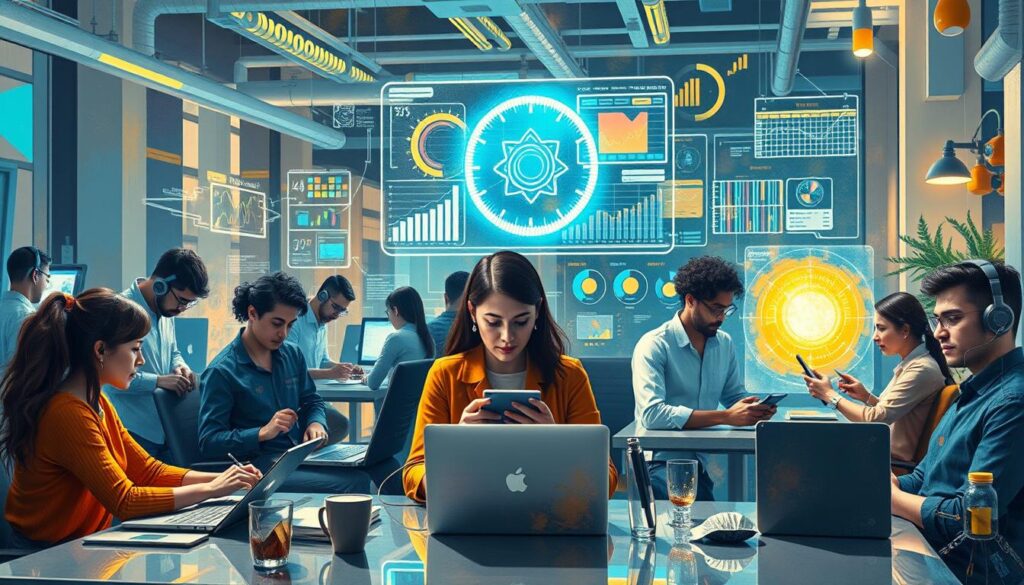
Technical Competencies
- Programming
- Data analysis
- Machine learning
Soft Skills That AI Cannot Replace
- Empathy
- Creativity
- Critical thinking
Cross-Functional Expertise Requirements
As AI grows, it will create new jobs. But, people need to learn skills AI can’t replace. They should also be digitally fluent and adaptable to succeed in this changing world8. The World Economic Forum’s Future of Jobs Report says we’ll need more problem-solving, critical thinking, and emotional intelligence in the 2020s9.
Strategies for Professional Adaptation
As artificial intelligence changes the job market, professionals need to adapt. They must understand how AI affects jobs and skills. It’s important to learn new skills that work well with AI.
Continuous learning is key, with courses in data analysis, AI basics, and digital ethics. This helps professionals stay ahead in their careers10.
Adapting means moving into roles that AI can’t take over. Skills in AI development and maintenance make professionals more valuable11. Also, soft skills like communication and teamwork help work well with AI and others.
Some ways to adapt include:
- Continuous learning pathways, such as online courses and training programs
- Career transition planning, including identifying new job roles and industries
- Building an AI-proof skill set, with a focus on skills that complement AI, such as critical thinking, creativity, and problem-solving12
By using these strategies, professionals can get ready for AI’s changes. They can succeed in the new workforce10.
| Strategy | Description |
|---|---|
| Continuous Learning | Engaging in courses and certifications to remain competitive |
| Career Transition Planning | Identifying new job roles and industries |
| Building an AI-Proof Skill Set | Focusing on skills that complement AI, such as critical thinking and problem-solving |
Conclusion: Embracing the AI Revolution in Your Career Journey
As we enter the era of artificial intelligence, it’s key to grasp how AI changes jobs and skills. Bruce Milligan says AI can automate boring tasks, freeing us to do creative and innovative work. The job market will evolve with AI, bringing new jobs and changing old ones13.
AI’s rise means some jobs might disappear, but it also creates new ones like AI research scientists and ethicists13. By 2025, AI could take away 85 million jobs but add 97 million new ones, netting 12 million jobs14. To keep up, we need to learn new skills, like technical abilities, soft skills, and expertise in different areas.
The need for AI jobs is set to jump by 50% in the next five years15. As companies use AI, they’ll look for people with creativity, critical thinking, and adaptability, along with technical skills13. By embracing AI, we can get ready for the future and work well with AI.
In summary, AI is changing the job world, and it’s vital to understand its effects on jobs and skills. By learning the right skills and adapting professionally, we can build a future where humans and AI work together. This future will be full of chances for growth and innovation14.
FAQ
What is the impact of AI on jobs and skills in today’s workforce?
How is AI integration transforming various industries?
Which jobs are most vulnerable to AI automation?
What are the emerging opportunities in the AI-driven economy?
What essential skills are required for the AI era?
How can professionals adapt to the AI-driven workforce?
What is the role of AI in augmenting human capabilities?
How can businesses prepare for the AI-driven economy?
Source Links
- AI and future of work in 2025 | DW Observatory – https://dig.watch/topics/future-of-work
- Crowdsourced production of AI Training Data: How human workers teach self-driving cars how to see – https://www.econstor.eu/bitstream/10419/216075/1/hbs-fofoe-wp-155-2019.pdf
- Redefining Work: How AI is Shaping the Future of Jobs, Skills, and Human Potential – https://medium.com/@EdwigeRobinson/redefining-work-how-ai-is-shaping-the-future-of-jobs-skills-and-human-potential-e225027a9135
- 4 Ways AI Impacts the Job Market & Employment Trends – https://onlinedegrees.sandiego.edu/ai-impact-on-job-market/
- What White-Collar Jobs Are Safe From AI—And Which Professions Are Most At Risk? – https://www.forbes.com/sites/jackkelly/2024/02/28/what-white-collar-jobs-are-safe-from-ai-and-which-professions-are-most-at-risk/
- AI Jobs Barometer – https://www.pwc.com/gx/en/issues/artificial-intelligence/ai-jobs-barometer.html
- The Future of Work: AI’s Impact on Jobs and Skills in 2024 – https://www.linkedin.com/pulse/future-work-ais-impact-jobs-skills-2024-dave-balroop-2u28c
- Essential Skills for IT Professionals in the AI Era – https://spectrum.ieee.org/it-professionals-in-ai-era
- AI era essential skills – https://www.linkedin.com/pulse/ai-era-essential-skills-northreach-uk-ppvze
- Adapting to AI: Essential Skills for a New Era of Employment – https://www.refer.me/blog/adapting-to-ai-essential-skills-for-a-new-era-of-employment
- AI Adaptation Strategies to Thrive in the Job Market – AICerts – https://www.aicerts.ai/blog/ai-adaptation-strategies-to-thrive-in-the-ever-evolving-job-market/
- Council Post: How Artificial Intelligence Is Transforming The Job Market: A Guide To Adaptation And Career Transformation – https://www.forbes.com/councils/forbestechcouncil/2025/01/10/how-artificial-intelligence-is-transforming-the-job-market-a-guide-to-adaptation-and-career-transformation/
- Embracing the AI Revolution: Emerging Career Paths in the Age of Artificial Intelligence – https://www.linkedin.com/pulse/embracing-ai-revolution-emerging-career-paths-age-devasish-banerjee-1dmrc?trk=public_post
- AI’s Career Revolution | Michael Harn – https://mharn.esourcecoach.com/ais-career-revolution/
- Beyond Reskilling: AI’s Impact on Career Paths – https://www.linkedin.com/pulse/beyond-reskilling-ais-impact-career-paths-stewart-townsend-u37fe
